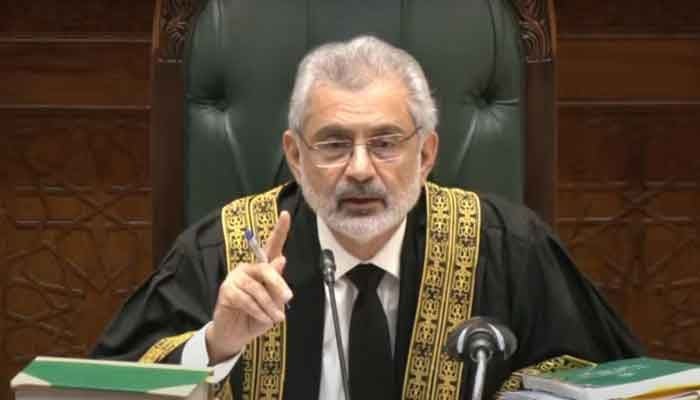Chief Justice Qazi Faiz Isa has delivered a resounding message to lawyers and litigants in Pakistan’s courts: eliminate the notion of seeking adjournments in court cases without valid reasons. In a session held at the Supreme Court, he emphasized that the practice of requesting unnecessary adjournments should end, and lawyers and parties involved should refrain from thinking that they can delay proceedings by approaching the Supreme Court.
The Chief Justice made it explicit that from now on, cases in the Supreme Court would not be adjourned without a valid reason. This message is aimed at streamlining court processes and ensuring that cases are heard and decided efficiently, without undue delays.
During the hearing, Chief Justice Faiz Isa raised questions about the authority of the Chief Minister of Balochistan regarding land transfers. He pointed out that the Quetta Development Authority (QDA) is a legally established institution in which the Chief Minister does not hold authority. He encouraged the parties involved not to indulge in any unnecessary legal wrangling, highlighting that this matter should be straightforward.
When the lawyer representing the petitioner was asked about the details of the agreement, he appeared evasive and was unable to provide a clear answer. Chief Justice Faiz Isa questioned whether the term “bain” (between) used in the document referred to a specific date or a historical context. He further urged the lawyer to present evidence in a coherent manner.
The lawyer argued that his client wished for the remaining land to be transferred to the Quetta Development Authority. However, the Chief Minister had imposed a ban on land transfers, causing the matter to come before the court.
Chief Justice Faiz Isa’s stance during the hearing conveyed that the petitioner’s case had not seen any progress in court for 35 years regarding the execution of the agreement. He made it clear that it was not acceptable for someone to bring government or administrative contracts before the court on a whim.
The lawyer representing the petitioner requested an adjournment, stating that another opportunity should be given to present facts before the court effectively. Chief Justice Faiz Isa’s response was categorical: there would be no more adjournments. He reinforced that there are already numerous cases pending in the Supreme Court under adjournments, and from now on, a notice would be issued to parties involved on a specific date for the next hearing.
In essence, Chief Justice Faiz Isa’s message was unequivocal: the Supreme Court aims to expedite proceedings and discourage unnecessary delays through adjournments. This approach underscores the importance of efficiency and accountability in the legal process while ensuring that all parties have a fair and timely opportunity to present their case.



